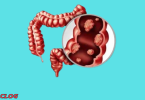Colon cancer symptoms often do not appear during the early stages of the disease, and although there may be some warning signs, colon cancer symptoms may not develop until the disease advances to stage II or beyond. Cancer screenings for people over 50 who are at risk or have a family history of the disease. We learn more about the symptoms of colon cancer in this report.
The first symptoms of colon cancer
Colon cancer symptoms may appear mild and early as a warning, because most colon or rectal cancers develop from benign tumors. Screening aimed at detecting and eliminating them as soon as they first form helps prevent them from developing into cancers.
If early-stage colorectal cancer causes symptoms, warning signs or symptoms of colon cancer may include:
- Sudden and unexplained weight loss.
-Bar chair.
- Bleeding from the rectum, bright or dark red.
- Feeling like you have to empty your bowels but nothing happens.
- Anemia due to iron deficiency.
- Persistent abdominal pain.
Although these symptoms can be caused by other, less serious conditions, such as hemorrhoids, ulcers, and Crohn’s disease, they should be discussed with your doctor. The presence of blood in the stool should never be ignored, even if it appears intermittently.
Colon cancer symptoms that only affect the colon
Colon cancer symptoms only affect the colon or rectum and do not spread to distant organs. These symptoms include:
-You are detained.
- Diarrhea.
- Alternating diarrhea and constipation or other changes in bowel habits.
- Bleeding from the rectum or blood in the stool.
- Abdominal bloating, cramps, or discomfort.
- Feeling that the bowel has not been completely emptied.
- Stools that are thinner than usual.
Symptoms of systemic colon cancer
Systemic symptoms of colon cancer can affect more than the digestive system and affect the entire body. Common systemic symptoms of colorectal cancer include:
- Unexplained loss of appetite
- Unexplained weight loss
- nausea.
- Vomiting.
- Jaundice or jaundice.
- Anemia.
- Weakness.
- exhausted.
Common symptoms of colon cancer
In the early stage of colon cancer, there may be no obvious signs or symptoms. As symptoms develop, they may vary depending on the size of the tumor and its location in the large intestine. Early symptoms may affect only the colon and lead to changes in bowel habits. As the cancer grows, it can spread. This leads to systemic symptoms that affect the entire body, such as fatigue and weight loss. Some changes in bowel habits that may be considered signs of colon cancer include:
- Change in stool frequency.
-You are detained.
- Change in stool consistency (soft or watery stool).
- Blood in the stool (either in the form of bright red spots or dark, tar-like stools).
- Rectal bleeding.
- Abdominal pain, bloating, or cramps.
- A constant feeling of inability to completely empty the intestines.
Symptoms of rectal cancer
Rectal cancer symptoms may be similar to those of other bowel diseases, such as ulcerative colitis or Crohn’s disease, but although inflammatory bowel disease symptoms may improve during periods of remission, rectal cancer symptoms may be more severe and persistent like cancer. Move forward.
Rectal tumors can change the consistency, shape, or frequency of stool. Symptoms may increase and worsen as the cancer spreads to the rectum or possibly the colon. Signs of rectal cancer related to bowel habits may include:
- Diarrhea
-You are detained
- Inability to completely empty the bowel
- Bloody stool
- Change in the size or shape of stool
Symptoms of systemic colon cancer
Systemic symptoms of colon cancer can affect more than the digestive system and affect the entire body. Common systemic symptoms of colorectal cancer include:
- Unexplained loss of appetite
- Unexplained weight loss
- nausea.
- Vomiting.
- Jaundice or jaundice.
- Anemia.
- Weakness.
- exhausted.
Common symptoms of colon cancer
In the early stage of colon cancer, there may be no obvious signs or symptoms. As symptoms develop, they may vary depending on the size of the tumor and its location in the large intestine. Early symptoms may affect only the colon and lead to changes in bowel habits. As the cancer grows, it can spread. This leads to systemic symptoms that affect the entire body, such as fatigue and weight loss. Some changes in bowel habits that may be considered signs of colon cancer include:
- Change in stool frequency.
-You are detained.
- Change in stool consistency (soft or watery stool).
- Blood in the stool (either in the form of bright red spots or dark, tar-like stools).
- Rectal bleeding.
- Abdominal pain, bloating, or cramps.
- A constant feeling of inability to completely empty the intestines.
Symptoms of rectal cancer
Rectal cancer symptoms may be similar to those of other bowel diseases, such as ulcerative colitis or Crohn’s disease, but although inflammatory bowel disease symptoms may improve during periods of remission, rectal cancer symptoms may be more severe and persistent like cancer. A step forward.
Rectal tumors can change the consistency, shape, or frequency of stool. Symptoms may increase and worsen as the cancer spreads to the rectum or possibly the colon. Signs of rectal cancer related to bowel habits may include:
- Diarrhea
-You are detained
- Inability to completely empty the bowel
- Bloody stool
- Change in the size or shape of stool
Symptoms of colon cancer that has spread throughout the body
Symptoms of metastatic colorectal cancer depend on the size of the tumor(s) and where the cancer has spread outside the colon or rectum. For example:
- If bones are affected, symptoms may include pain, fractures, constipation, and/or high calcium levels.
- If the lungs are affected, symptoms may include shortness of breath, difficulty breathing, cough, pain and/or fatigue.
-If the liver is affected, symptoms may include nausea, fatigue, swelling of the feet and hands, increased abdominal circumference, and/or jaundice.
- If the lymph nodes in the abdomen are affected, this may cause bloating, gas, or loss of appetite.
- If the brain or spinal cord is affected, symptoms may include pain, confusion, memory loss, headache, blurred or double vision, difficulty speaking, or epilepsy.







